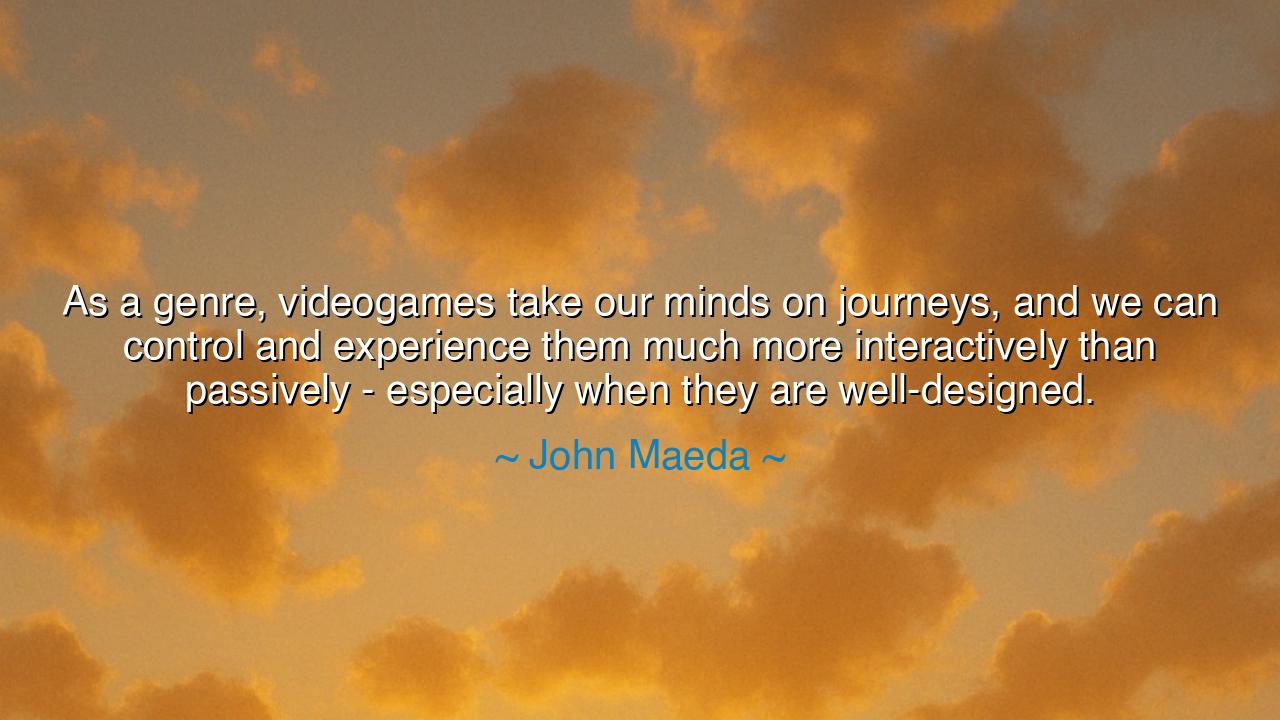
As a genre, videogames take our minds on journeys, and we can
As a genre, videogames take our minds on journeys, and we can control and experience them much more interactively than passively - especially when they are well-designed.






In the wisdom of ages, let us ponder the words of John Maeda, who declared: “As a genre, videogames take our minds on journeys, and we can control and experience them much more interactively than passively—especially when they are well-designed.” This saying, though born in the modern age of circuits and code, carries within it the same pulse that once moved bards, philosophers, and poets. It speaks not merely of play, but of participation, of the sacred act of engaging one’s soul in the art of creation, rather than standing idle before it.
In the olden days, the storyteller’s fire burned bright in the center of the village. Men and women gathered round, listening, but they could not enter the tale. They could only imagine, behold, and believe. Yet now, through the craft of the videogame, the listener becomes the doer. No longer do we watch heroes conquer dragons; we become those heroes. Our choices shape the world; our failures and triumphs breathe life into the story. Thus, Maeda speaks of a profound shift—from the passive to the interactive, from the mere dreamer to the dream’s master.
Consider the tale of Shigeru Miyamoto, the creator of The Legend of Zelda. As a child, he wandered the hills and caves near Kyoto, filled with curiosity and awe. Years later, he sought to give that same wonder to others—not through words, but through experience. And so, he built a world where the player could explore as he once did, where each choice, each discovery, became an act of personal revelation. In that creation, the ancient yearning for adventure was reborn in digital form. Miyamoto did not merely design a game; he designed a journey of the mind, echoing Maeda’s truth.
The interactivity Maeda speaks of is no small gift. It mirrors life itself. For are we not all players in the grand game of existence? To live well is not to sit in the audience of our own days, but to grasp the controller of fate, to act, to decide, to shape what we behold. A well-designed game, like a well-lived life, rewards courage, patience, and curiosity. It teaches that mastery is not given—it is earned through effort and reflection.
Yet Maeda also warns us subtly with his final phrase: “especially when they are well-designed.” For not all journeys uplift the spirit. Some games, like some lives, are made in haste, offering only hollow pleasure and empty repetition. True design, whether of art or of living, requires intent, balance, and meaning. A poorly crafted world teaches little; a thoughtful one transforms the soul.
Therefore, dear listener, the lesson is this: do not drift as a spectator through the world. Be as the player who learns, adapts, and dares. Engage your mind, your heart, your hands. Create. Choose. Reflect. For the universe itself, like a grand game, invites your participation. The path is yours to shape, the experience yours to live.
And when your days are long and the world feels vast, remember Maeda’s words. Seek not only to observe beauty but to enter it. Seek not only to dream but to build the dream. For the true journey of the mind begins when you cease to be a mere watcher of life—and become its interactive designer.






AAdministratorAdministrator
Welcome, honored guests. Please leave a comment, we will respond soon